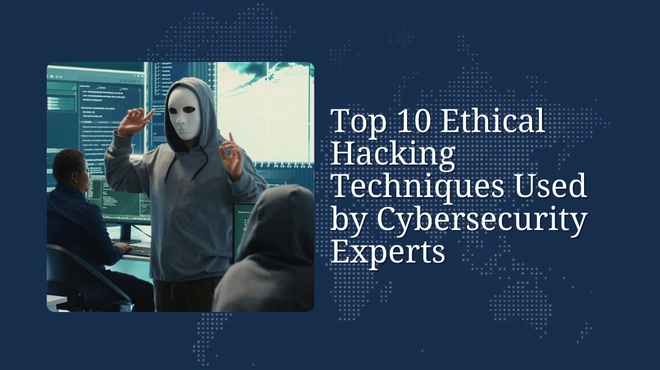
Top 10 Ethical Hacking Techniques Used by Cybersecurity
Boost your cybersecurity career—master the 10 advanced ethical hacking techniques used by experts and gain CEH-level skills to
Cease being merely a security analyst. Obtain the universally recognized qualification that confirms you are a certified Information Security Leader, providing access to executive roles and the highest remuneration levels.
You’re currently engaged in the daily struggles of cybersecurity—addressing security holes, administering permissions, and mitigating email-based threats. You manage the technical implementation, but you are frequently excluded from the strategic justification: enterprise security design, oversight, and financial planning. While you remain technical, CISSP-certified experts operate at the executive tier, setting organizational policy, determining risk tolerance, and earning compensation up to $60\%$ greater. Headhunters specifically seek "CISSP Certification REQUIRED" for almost every senior security position—without this credential, your application will not be considered. This changes immediately. This is not just another training session filled with technical terms or excessive presentations. Our CISSP Certification Training was developed by practicing CISSP-certified CSOs and Principal Security Architects who protect the largest banking, telecommunication, and government infrastructures in your region. They have crafted a CISSP training experience that assists you in mastering the $(ISC)^2$ framework while applying Governance, Risk, and Compliance (GRC) concepts to authentic enterprise challenges in the local area. In contrast to standardized study programs, our CISSP course develops genuine leadership competence. You will gain the skills to establish organization-wide Security and Risk Management programs, architect robust Security Architecture and Engineering platforms, and mandate Software Development Security starting with the initial source code. The CISSP exam is simply proof—the true benefit is being able to enter a meeting room and present a risk-balanced defense plan that secures leadership trust. Structured for working individuals, this CISSP certification training provides adaptable weekday and weekend schedules, live classes with dynamic Q&A, and $24/7$ assistance. You will additionally receive a carefully selected library for exam readiness, access to a CAT-simulated query platform, and actionable advice to minimize CISSP certification cost and enhance achievement.
Learn with confidence knowing your training program is structured precisely around the latest 8 domains of the CISSP Common Body of Knowledge (CBK).
Unlock your potential with expert instructors who are CISSP-certified practitioners currently working in senior risk and security leadership roles.
Master the Adaptive Testing methodology with 10+ full-length, computer-adaptive mock exams that replicate the real CISSP testing environment.
Accelerate your mastery with 40+ hours of strategic, scenario-based learning and in-depth domain reviews designed to build lasting competence.
Strengthen your weak areas with 2000+ technically accurate, tailor-made practice questions focused on management, architecture, and governance.
Get round-the-clock access to certified security leaders who can help you resolve complex domain, architecture, and governance challenges.

Get a custom quote for your organization's training needs.
Learn to establish governance frameworks, define risk appetite, and manage compliance with Columbus, OH and international regulations such as the IT Act and GDPR.
Master the design and implementation of secure principles in system and component architecture, including cryptography, secure kernel access, and secure hardware design.
Advance your CISSP training with network-level defense. Learn to design segmented, zero-trust networks, configure secure communication protocols like TLS and IPsec, and implement intrusion prevention systems aligned with CISSP certification standards.
Design and implement enterprise-wide IAM solutions covering federation (SAML), single sign-on (SSO), multi-factor authentication (MFA), and access control models.
Operate like a seasoned security leader. Learn to manage a modern Security Operations Center (SOC), plan disaster recovery strategies, and enforce physical and environmental security controls - all core areas in CISSP certification training.
Integrate security across the software development lifecycle (DevSecOps). Learn to define application security requirements, apply secure coding standards, and manage vulnerabilities effectively.
If you possess 5 or more years of overall, compensated, full-time professional experience across a minimum of two of the eight CISSP domains and your professional path necessitates executive presence and high-level decision-making, this certification is absolutely essential.


Earn the CISO/Director-level credential that gets you past automated filters and into top-tier interviews.
Position yourself for the elite compensation packages reserved for certified, strategic security leaders.
Build credibility with auditors, boards, and international peers as a recognized cybersecurity leader.
The CISSP certification is globally recognized as the gold standard for information security leadership. It is not an entry-level credential - it validates both deep technical expertise and proven professional experience. Below is the clear breakdown of what you need to qualify.
Mandatory Experience: A minimum of 5 years of cumulative, paid, full-time work experience in at least two of the eight CISSP domains of the CBK.
Education Waiver: A 4-year college degree or regional equivalent can substitute for 1 year of the required experience.
Endorsement Requirement: After passing the exam, candidates must be formally endorsed by an active CISSP holder to obtain the full certification.
Reality Check: There are no shortcuts. This training prepares you for the exam, but you must verify your experience with (ISC)² to receive the official credential.
Design and implement robust security controls within system architectures. Learn key security models, secure design principles, and fundamental cryptographic concepts that underpin secure systems development.
Develop and apply comprehensive physical and environmental security controls while mastering the security architectures of SaaS, PaaS, and IaaS cloud environments, including virtualization and containerization security.
Dive deep into the world of cryptographic services and PKI (Public Key Infrastructure). Learn key management, encryption algorithms, and digital signature techniques that ensure integrity, confidentiality, and non-repudiation.
Master network design principles and secure network component configurations. Explore OSI and TCP/IP models, secure segmentation techniques (VLANs, DMZs), and controls for securing wireless access.
Gain command of firewalls, intrusion detection/prevention systems (IDPS), and VPNs. Learn to implement secure communications using protocols like TLS and IPsec for enterprise-grade protection.
Embed security throughout the software development lifecycle (SDLC) using DevSecOps principles. Learn secure coding, security testing, code review practices, and the management of both internal and third-party software risks.
Design and implement IAM systems that balance security and usability. Learn about identity lifecycle management, access control models (RBAC, DAC, MAC), and robust authorization mechanisms.
Explore authentication methods including Single Sign-On (SSO), Federation (SAML, OAuth), and Multi-Factor Authentication (MFA). Learn to mitigate common identity-related attacks and enforce secure authentication practices.
Master vulnerability assessment, penetration testing, and control validation strategies to measure and strengthen the effectiveness of enterprise security programs.
Understand the critical functions of a Security Operations Center (SOC). Learn incident management processes, forensic evidence collection, and configuration management for operational resilience.
Design, document, and test effective Business Continuity (BCP) and Disaster Recovery (DRP) plans to ensure business resilience and rapid recovery from critical disruptions.
Address the human factor in cybersecurity through personnel screening, ongoing security awareness programs, and enforcement of policies such as acceptable use and mandatory vacations.

Our experts are ready to help you with any questions about courses, admissions, or career paths. Get personalized guidance from industry professionals.
"PMI®", "PMBOK®", "PMP®", "CAPM®" and "PMI-ACP®" are registered marks of the Project Management Institute, Inc. | "CSM", "CST" are Registered Trade Marks of The Scrum Alliance, USA. | COBIT® is a trademark of ISACA® registered in the United States and other countries. | CBAP® and IIBA® are registered trademarks of International Institute of Business Analysis™.


